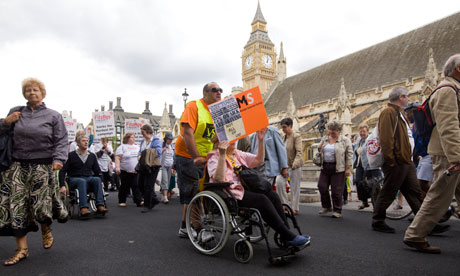You can use these to set yourself practice exercises - feel free to hand in any subsequent essays for marking and feedback:
Representation of Physical Ability/Disability
Tuesday, 24 February 2015
Sunday, 22 February 2015
June 2012 exam: Coming Down From the Mountain
This was the only example, so far, of physical dis/ability being the exam focus. The clip is embedded below, plus a full marks exam essay (not from an IGS student, but from a CHS student - see http://mediachs.edublogs.org/film-industry/as-exam-past-papers-answers/)
FULL MARKS SAMPLE STUDENT EXAM ESSAY:
FULL MARKS SAMPLE STUDENT EXAM ESSAY:
SOME POINTERS...
Tuesday, 13 January 2015
Theory of Everything: 'cripping up' attacked
We wouldn’t accept actors blacking up, so why applaud ‘cripping up’?
http://gu.com/p/44zjy
Tuesday, 1 April 2014
Disability Intersections and 'cisgender'
 Portraying marginalised groups accurately and sympathetically can remove
some of the prejudice surrounding them, so including these characters
is paramount. Disabled people are one of the groups who are still
lacking accurate and respectful representation in the media. (Alice Hewitt, 2014, from the article pictured, left)
Portraying marginalised groups accurately and sympathetically can remove
some of the prejudice surrounding them, so including these characters
is paramount. Disabled people are one of the groups who are still
lacking accurate and respectful representation in the media. (Alice Hewitt, 2014, from the article pictured, left) Stumbled across this online magazine looking for something else: this particular article/essay has a rather distinctive voice, adding a feminist critique on top of considering disability representation in isolation. As I'll often point out, it makes sense to consider any given category in combination with others too - this writer addresses sexuality as much as gender.
The author uses a term I hadn't previously encountered, cisgender ... the Wiki seemed a reasonable enough summary:
Cisgender and cissexual (often abbreviated to simply cis) describe related types of gender identity where an individual's experience of their own gender matches the sex they were assigned at birth.[1] Sociologists Kristen Schilt and Laurel Westbrook define cisgender as a label for "individuals who have a match between the gender they were assigned at birth, their bodies, and their personal identity" as a complement to transgender.[2]
There are a number of derivatives of the terms in use, including cis male for "male assigned male at birth", cis female for "female assigned female at birth", analogically cis man and cis woman, as well as cissexism and cissexual assumption. In addition, certain scholars have begun to use the term cisnormativity, akin to the queer studies' heteronormativity.[3][4] A related adjective is gender-normative; Eli R. Green has written that "'cisgendered' is used [instead of the more popular 'gender normative'] to refer to people who do not identify with a gender diverse experience, without enforcing existence of a 'normative' gender expression".[5]
Top Ten Disabled TV Characters
This is an American list; who would you suggest if attempting to do a comparable UK TV character list? See http://www.squidoo.com/TV-disability.

There are alternative lists out there:
the WheresLulu site had a useful (US again) list in 2011;
InTheseTimes.org brings this up to date with a critical look from late 2013 at what examples are out there and what is upcoming (the Michael J Fox character with Parkinson's is highlighted);
WhatCulture Top10 Film Characters.

There are alternative lists out there:
the WheresLulu site had a useful (US again) list in 2011;
InTheseTimes.org brings this up to date with a critical look from late 2013 at what examples are out there and what is upcoming (the Michael J Fox character with Parkinson's is highlighted);
WhatCulture Top10 Film Characters.
TV Tropes - common representations
The TVTropes.com website (a Wiki) has its issues, and its judgements can be questioned, but it is a useful resource for getting your head round recurring ways in which certain character types are represented. NB: the language can be a little blunt at times, but I think the lack of PC'ness (political correctness) is acceptable given that the site is largely EXPOSING the prejudice and stereotyping of much of our TV.
You can see pictured some of the headings for tropes they have linked with the theme of disability; sample entry (for 'Disabled Means Helpless'):
I'm not familiar with that show, but the style of humour is reminiscent of the 1989 Wilder/Pryor vehicle, See No Evil, Hear No Evil - trailer below; you can watch a typical clip here, but note that it contains some strong language.
You can see pictured some of the headings for tropes they have linked with the theme of disability; sample entry (for 'Disabled Means Helpless'):
Disabled Means Helpless
Spagna (cutting Pelswick's food): There! All done!Pelswick: Thanks for doing that, but it's my legs that don't work, not my teeth.When some people meet a person with a disability, they automatically assume that the individual is totally incapable of looking after themselves, and treat them as such. Most egregiously, some people even assume that having one disability equals having every disability! These people are the ones who insist on SHOUTING AT THE BLIND, assuming they can't hear, either. These patronizing attitudes often create resentment on the part of people with disabilities. In fiction, they have little problem telling the offender exactly that. Learning this is not true is often the point of a Very Special Episode. Contrast this trope to the Handicapped Badass, who everyone can instantly tell is not to be messed with.
— Pelswick, "Hear No Evil, P.C. No Evil"
I'm not familiar with that show, but the style of humour is reminiscent of the 1989 Wilder/Pryor vehicle, See No Evil, Hear No Evil - trailer below; you can watch a typical clip here, but note that it contains some strong language.
Tuesday, 29 January 2013
Twitter campaign and hate speech
An article from The Guardian's "Comment is Free" today carries very clear info on how the notion of the disabled as the other, or always the alien/different one in any group, carries beyond constantly repeated negative media representations. We can talk about anything or any concept that becomes 'common-sensical' (few argue against it) as hegemonic: the concept coined by Antonio Gramsci to illustrate how power is exercised as much through cultural control as through police and military power. The media impact can also be described as normative: making something appear normal or typical (eg, romance is for heterosexual couples, disabled characters are burdensome and odd, not like 'us', the majority of 'normal' folk).
Although many of the comments were essentially hate speech, the Twitter example given here shows how the power of mainstream, mass media can be undercut by small campaign groups or individuals on social networks - in some cases at least.
Article link. It carries some strong language, quoting abusive comments.
Although many of the comments were essentially hate speech, the Twitter example given here shows how the power of mainstream, mass media can be undercut by small campaign groups or individuals on social networks - in some cases at least.
Article link. It carries some strong language, quoting abusive comments.
Disability in society: let's make today #letstalkdisability day
Social media has been useful in triggering a positive debate on how to talk about disability in public. What do you want to ask?
A demonstration by disabled people against cuts to their benefits in Westminster, London. Photograph: Martin Argles for the Guardian
Disabled people are at an impasse. After years of campaigning, the public is finally waking up to the unfair and arbitrary cuts we face under this government. Monday night's Panorama was just one more mainstream documentary highlighting the struggles we face accessing financial and social support. This time, the focus was on private companies that are awarded government contracts to help find disabled people work, yet show scant regard or support for the people they are being paid to help. Panorama claimed to have found evidence of staff using the code "LTB" – lying, thieving bastards – to refer to disabled and unemployed people. How can we expect to be treated with dignity and respect in this context?
Yesterday, the Twitter hashtag #HeardWhilstDisabled gave a pithy insight into the prejudice disabled people are exposed to every single day. The comments people face about their disability on a daily basis ranged from the depressingly offensive ("I think I'd rather kill myself if I was like you. No offence.") to the daily frustrations of accessing basic services ("Couldn't you get your chair into a normal fitting room? We use the accessible one for storage.")
Almost every person with a disability has a similar story to tell.
Subscribe to:
Posts (Atom)




